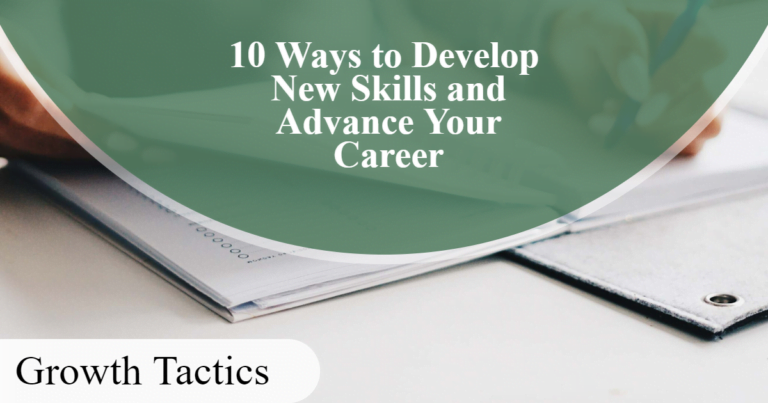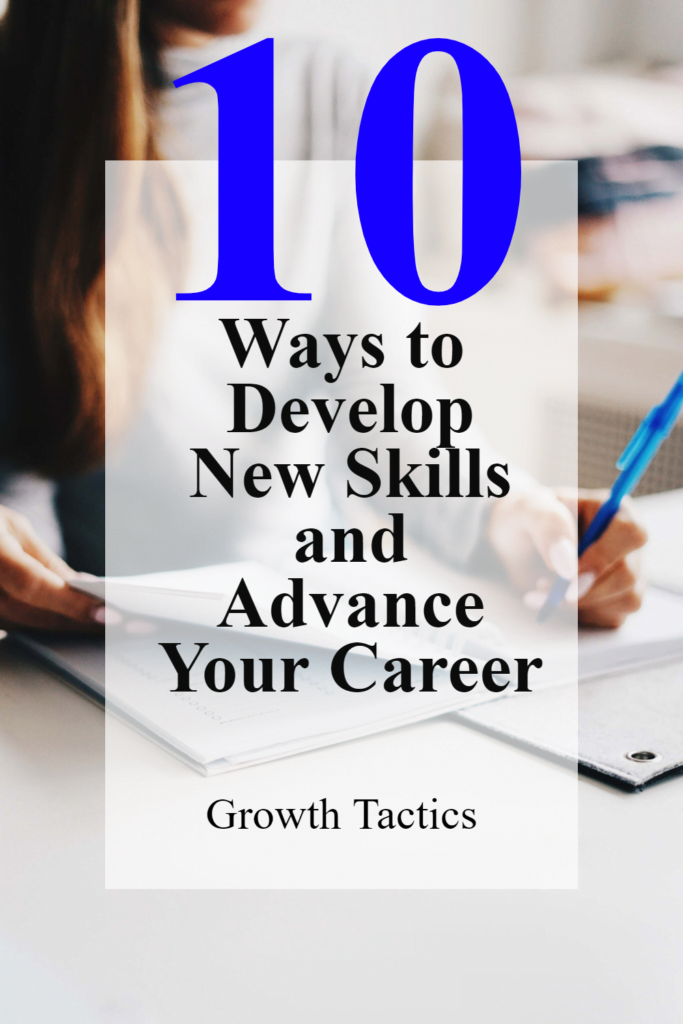In a rapidly evolving job market, the quest to remain relevant can be both exhilarating and daunting. As someone who’s fervently walked the path of self-improvement, I can attest to the power of proactively developing new skills. It’s not merely about climbing the career ladder; it’s about sculpting a versatile, resilient professional persona that thrives in diverse environments.
Each step I’ve undertaken to enhance my skillset has been a stepping stone not only towards professional success but also personal enrichment. By identifying crucial skills within my industry, setting precise learning goals, and embracing both formal and informal learning platforms, I have expanded my professional repertoire and deepened my capabilities. Online courses and certifications honed my technical know-how, acting as invaluable assets in my toolbox, while on-the-job training provided a hands-on experience that no theoretical learning could match.
Participation in workshops and continuous education programs fed my innate curiosity and kept me at the forefront of industry trends. In parallel, technology served as a potent ally, with apps and online resources offering on-demand knowledge at the touch of a fingertip.
Networking didn’t just acquaint me with new people; it opened doors to mentoring relationships that have been pivotal in my career and personal development. Volunteering, a venture often underrated, enriched my life with perspective and diversified my abilities beyond the confines of a conventional career path.
In quieter moments, books and podcasts have been my sanctuaries, providing me with insights distilled from the expertise and experiences of thought leaders across the globe. Lastly, reflection and adaptation have been my steadfast companions, reminding me that the assimilation of feedback is crucial for growth.
This synthesis of experiences hasn’t only sculpted a career, it has built a life. Here are 10 concrete ways in which you can, like I have, develop new skills and advance not just in your career, but in building yourself as a whole being.
Jump To Section
Identify the Skills Needed in Your Field
The journey to professional development begins with a clear understanding of the destination. Identifying the skills required in your field or desired position is your first step toward orienting your learning efforts effectively. Here’s how:
Explore Job Descriptions and Industry Trends: Look at job postings on platforms like indeed.com and LinkedIn for positions you aspire to. Notice common skills and requirements across these postings. Reading industry publications and attending professional webinars can also give you an idea of emerging trends and requisite skills.
Seek Insights from Professionals: Engage with mentors and network through platforms like LinkedIn to gain insights into the skills most valued in your industry. Conversations with colleagues and superiors can also shed light on areas for improvement or skills in demand.
Evaluate Current Skills: Assess your current skills against those identified as in demand for your field. Tools like spreadsheets can help you systematically analyze gaps and identify the skills you need to develop or hone.
Set Clear Learning Goals
With a comprehension of what skills you need to acquire or improve upon, the next step is designing a roadmap to achieve these competencies. Setting clear, achievable learning goals is crucial:
SMART Goal Setting: Ensure your goals are Specific, Measurable, Achievable, Relevant, and Time-bound. Whether it’s learning a new programming language within six months or improving your public speaking skills, specificity provides direction, and measurability enables progress tracking.
Break Down Your Goals: Large goals can feel daunting. Break them down into manageable, bite-sized tasks. If your goal is to become proficient in a second language, start with dedicating a few hours each week to online courses or language exchange meetups.
Monitor Your Progress: Use tools like journals or digital apps to track your learning journey. Celebrate milestones to stay motivated and adjust your strategy as you gain new insights and experiences.
Seek Feedback: Regular feedback from peers, mentors, or through online forums can provide valuable insights into your progress and areas needing more focus. Constructive criticism is crucial for growth, so actively seek it out.
10 Ways to Develop New Skills
Building on the steps to identify necessary skills and set goals, here’s how you can practically advance your skill development efforts:
1. Experimentation and Personal Projects
Embarking on personal projects is an immensely effective way to transfer theoretical knowledge into practical expertise. By applying new skills to projects you are genuinely passionate about, you not only enhance your learning experience but also create tangible evidence of your abilities.
- Innovative Problem-Solving: Personal projects often stem from a desire to solve problems or fulfill specific needs. This encourages innovative thinking and application of skills in new, often unexplored ways.
- Portfolio Building: Completed projects serve as a portfolio that showcases your initiative, creativity, and technical prowess to prospective employers or clients. It’s a compelling way to demonstrate what you know and how you can apply it in real-world scenarios.
- Feedback and Iteration: Sharing your projects within your network or community can provide valuable feedback, pushing you to refine and iterate on your ideas. This feedback loop is crucial for continuous improvement and mastery of new skills.
2. Join Professional or Trade Organizations
Being part of a professional or trade organization is incredibly beneficial for anyone looking to deepen their industry knowledge and network with like-minded professionals.
- Resource Access: These organizations often have libraries, publications, and exclusive research that can keep you abreast of the latest trends, technologies, and methodologies in your field.
- Certification and Endorsements: Many organizations offer professional certifications that can bolster your credentials and demonstrate your commitment to your career and continued learning.
- Community Engagement: Active participation in these organizations can lead to leadership opportunities, further establishing your reputation in the industry.
3. Online Courses and Certifications
The digital revolution in education has democratized access to knowledge, making it easier than ever to learn new skills or deepen existing expertise.
- Specialized Learning Paths: Many platforms now offer learning paths or specializations, guiding learners through a curated series of courses to achieve mastery in a specific area.
- Peer Interaction and Projects: Online courses often include community forums and peer-reviewed projects, providing a platform for interaction, feedback, and learning from a global community of learners.
- Certifications: Completing courses can often lead to certifications, adding valuable credentials to your resume and LinkedIn profile.
4. On-the-Job Training
The workplace serves as an invaluable learning environment, providing immediate applications for new skills and concepts.
- Cross-functional Collaboration: Involvement in cross-departmental projects can broaden your skill set and give you a holistic understanding of how your organization operates.
- Feedback Loop: Continuous feedback from supervisors and peers in the workplace provides immediate insights into your performance and areas for improvement.
5. Attend Workshops and Training Courses
Structured workshops and courses offer a more traditional, but no less valuable, avenue for skill development and networking.
- Hands-on Experience: Many workshops offer hands-on experiences, using case studies, simulations, and live projects to reinforce learning.
- Exposure to Experts: These events are often led by industry experts or thought leaders, providing learners with access to invaluable insights and experiences.
- Networking Opportunities: Workshops and seminars provide a unique opportunity to meet professionals from various backgrounds, expanding your professional network.
6. Leverage Technology
In today’s connected world, technology offers endless resources for learning new skills, making it a crucial element in the pursuit of knowledge and professional development.
- Educational Apps: Platforms like Duolingo for language learning or Codecademy for coding present accessible, bite-sized training modules that cater to on-the-go learning. They seamlessly integrate learning into daily routines.
- Webinars and Online Tutorials: The internet is teeming with free or low-cost webinars and tutorials. Platforms such as YouTube host an extensive array of content ranging from beginner overviews to deep-dive tutorials in virtually any field imaginable.
- Virtual Reality (VR) and Augmented Reality (AR): These emerging technologies offer immersive learning experiences, especially in fields such as medicine, engineering, and design, by simulating real-world environments for hands-on practice without the physical constraints or risks.
7. Networking and Mentors
The values of networking and mentorship cannot be overstated, offering personalized pathways and insights into learning like no other.
- Professional Networks: Actively participating in industry events, conferences, and online forums not only keeps you updated with the latest trends but also connects you with potential mentors and peers from whom you can learn.
- Find a Mentor: A mentor who has navigated the path you’re on can provide tailored advice, encouragement, and constructive criticism. This relationship accelerates learning and opens doors to opportunities and insights that might otherwise remain out of reach.
8. Volunteer to Gain Diverse Experiences
Volunteering is a powerful way to apply your skills in real-world contexts and expose yourself to new challenges and learning opportunities.
- Nonprofit Organizations: Volunteering your time with nonprofits can allow you to work in various roles, from marketing to event planning, granting exposure to a broad skill set.
- Professional Associations: Contributing your skills to professional associations can immerse you in your industry’s core, allowing for unparalleled networking and learning opportunities.
9. Read Books and Listen to Podcasts
Dedicated time for reading and podcast listening can significantly deepen your expertise and keep you informed of industry trends and best practices.
- Curated Reading Lists: Many industry leaders and educational institutions publish reading lists. These curated selections can guide you through the vast amount of literature available, focusing your reading on the most impactful works.
- Podcasts: A growing number of podcasts cater to professionals seeking to expand their knowledge base. Whether it’s industry news, interviews with professionals, or seminars on specific skills, podcasts provide a convenient way to learn during commutes or downtime.
10. Reflect and Adapt to Feedback
Continuous improvement is key to lifelong learning. Regularly reflecting on your progress and adapting based on feedback ensures that your learning pathway remains effective and relevant.
- Self-reflection: Take time to assess your learning strategies, the new skills you’ve acquired, and how they apply to your goals. Reflecting helps in recognizing patterns, strengths, and areas for improvement.
- Seek Feedback: Engaging with mentors, peers, and online communities to solicit feedback provides you with external perspectives on your progress. Constructive criticism is instrumental in refining your approach and overcoming blind spots in your learning journey.
Incorporating these strategies into your career development plan can dramatically enhance your skill set, making you more adaptable, resourceful, and competitive in today’s fast-paced job market. Remember, the journey of learning is iterative and requires persistence, resilience, and a proactive mindset.
Conclusion
In an ever-evolving professional landscape, the pursuit of knowledge and skill development is not just beneficial but essential for career longevity and success. The strategies outlined provide a robust framework for anyone aiming to enhance their abilities and advance in their career.
By actively applying learning methods such as attending workshops, leveraging technology, networking, and partaking in personal projects, you open up a world of opportunities for personal and professional growth. Each approach offers unique benefits and when combined, they can significantly enrich your skill set and marketability.
It is crucial to remember that learning is a continuous journey. The landscape of work and technology is constantly changing, and staying adaptable through ongoing education and skill acquisition is the best way to ensure you not only keep up with the pace but also lead and innovate within your field.
Skill development should be seen as a sustainable, long-term investment in your career. By setting clear goals, actively seeking new knowledge, and continuously applying what you’ve learned, you’re setting the stage for a fulfilling and prosperous career journey. Embrace learning as a lifelong endeavor, and you will navigate the professional world with confidence and acumen.


